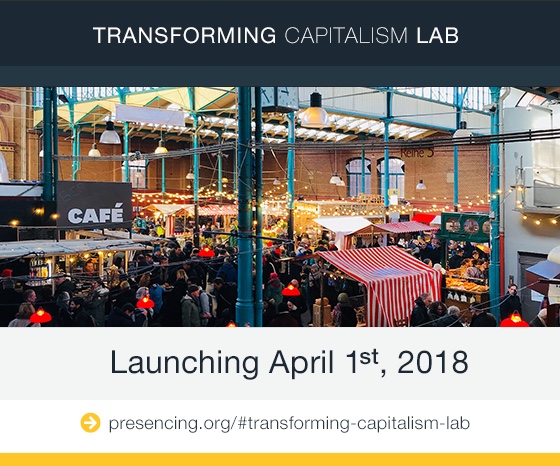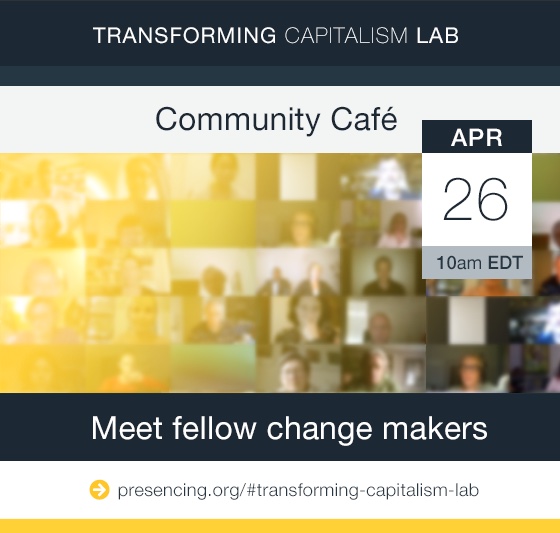What is Transforming Capitalism Lab (TCL)?
Presencing Institute launched the Transforming Capitalism Lab (TCL), in partnership with HuffPost, with the intention to create a platform that empowers and connects citizens from around the world to become active participants in creating change.
With the very bold ambition to support the transformation of Capitalism, because....
What if the change toward a more inclusive and sustainable society is actually much closer than we realize?
What could we do now to help bring it into reality?
And that's where YOU come in.
Invitation
Building upon two decades of action research at MIT and around the world, this Lab offers the following elements – all free of charge – providing opportunities for you and your network to:

Get Inspired
Live Global Sessions, featuring conversations with pioneering thought leaders & change makers, and guided mindfulness-based practices.
After each live session, you have the opportunity to join interactive small-group breakouts to learn directly from each other, ask questions and share insights about your own local change initiatives.
Editorial Content Gallery: Stories, interviews, and Op-Eds from practitioners and thought leaders working across eight issue-areas of the economy:
Beyond GDP: Creating economies that generate wellbeing for all;
Nature: Addressing the disconnect between infinite growth and finite resources;
Labor: Bridging the disconnect between work and purpose;
Capital: Relinking the financial and the real economy;
Technology: Addressing the disconnect between technology and our creative humanity;
- Business: Addressing the disconnect between profit and purpose;
- Government and Democracy: Bridging the disconnect between people and governance
- Education and Learning: Bridging the disconnect between learning and deep human creativity.
Connect with others across the world
Participate in virtual “Community Cafés”: every month, we will host calls, during which we may share our experiences and help each other to advance our initiatives.
Join or initiate a self-organized place-based hub. We invite people to gather in person to watch the live sessions and to practice methods and tools. Presencing Institute facilitators will offer hub-host support and guidance.
Access the member directory and profiles, including a direct messaging system.
Engage in Action
We’ll offer you tried and tested methods and tools, help you to apply them in your own context and showcase your journey or initiatives in a user-generated content gallery.
- An online workbook based on the Theory U methodology, will guide you on your self-paced journey from idea to action.
- A user-generated content gallery featuring emerging new economy stories, prototypes and examples from around the world. Workbook users will not only learn and apply new awareness-based change methods; the workbook also offers the opportunity to share the outcomes of one’s learning journeys, dialogue interviews, prototyping efforts, projects and more in a searchable user-generated content gallery.
Transforming Capitalism: Eight issue areas (Acupuncture Points) of the economy
We will host nine interactive live-broadcast sessions in 2018 and another nine in 2019. Each of the first eight sessions will focus on one specific acupuncture point of transforming capitalism. In each case we will feature the main systemic disconnect that defines the current crisis of capitalism and present stories and examples of practical alternatives that could address the issues at the root of these challenges. The ninth session of 2018 will focus on integration and synthesis.
In 2019, the second series of nine sessions will focus on bringing these (and related) practical alternatives to scale.
1. Beyond GDP
Creating economies that generate wellbeing for all
The way we create and measure progress in our economies around GDP is leading us down environmentally, socially and personally destructive paths. Most visible in developed economies, more GDP does not translate into more wellbeing.
How can we measure progress toward generating sustainable and inclusive economies that create wellbeing for all (people and planet)?
2. Nature
Addressing the disconnect between infinite growth and finite resources
We’re exceeding the carrying capacity of planet earth. What is the root issue? It’s what Karl Polanyi called “commodity fiction”: we treat nature as if it was a commodity. Our mindset with regards to nature is “take, make and waste”.
How can we redesign the economic process – from the personal to systemic levels – from a linear take, make, waste to a cyclical model of a regenerative economy?
3. Labor
Bridging the disconnect between work and purpose
The whole economic discourse today is about employment numbers. However, with automation, increases in productivity, etc., there’s no way we’ll ever come close to full employment again on a global scale. It is likely that the future of human work will largely focus on the creative domain and on empathy based human interactions and services.
How can we reinvent work in ways that tie it less to income and more to human purpose and actual social needs in our communities?
4. Capital
Relinking the financial and the real economy
The ever increasing decoupling of financial and real economy is pervasive and destabilizes economies and societies across the globe. Simply put, we have too much money in one place (money spent for speculation) and not enough in another (the real economy, particularly funds for regenerating our ecological, social, and cultural commons).
How can we redesign the flow of money in ways that deflates the bubble in the speculation side, and that regenerates the sources of all our commons?
5. Technology
Addressing the disconnect between technology and our creative humanity
Over the past few months and years we have seen a version of technology that tends to steer or manipulate us in ways that disconnect us from our real sources of happiness: our deep connection to others, to nature, and to ourselves. The Old Greek word for technology – techne– means art or creation. This is something we can still experience as true today: at the source of new technology creation is often the inspiration of making the world a better place.
Which technologies (and uses of technology) tend to disconnect us from the essence of our humanity, and which can help us strengthen and cultivate that link?
6. Business
Addressing the disconnect between profit and purpose
Business is the most powerful institution in society. It’s the only place where you can shape the entire production function as a whole. If the business of business is just profit, then we engage in practices that make us blind towards social and environmental impact. If the business of business is about generating wellbeing for all, then we engage in business practices that make us aware of the social and environmental impact (as specified in the 17 SDGs) turning business into a force for good.
What actually should be the purpose of business? What are the principles and practices that enable businesses to operate from a deeper purpose? What challenges do they face and how are those challenges overcome?
7. Government and Democracy
Bridging the disconnect between people and governance
There is a disconnect between governance (rule making) and the lived reality of people who are experiencing the impacts (rule taking). The feedback loop between the parts (especially the most marginalized in our communities) and the whole is broken and needs to be re-established.
What are the practical ways that can evolve our governance to be more direct, distributed, democratic, and dialogic?
8. Education and Learning
Bridging the disconnect between learning and deep human creativity
There is no shortage of great schools in the world today, but there is a shortage of great school systems. On the whole, education and learning today is overly focused on rote memorization and teaching for testing. It is not preparing students to meaningfully engage with today’s reality – to respond to the challenges of disruption by co-sensing and co-shaping emerging future possibilities through cultivating our deeper capacities for curiosity, compassion, and courage.
What are practical ideas for creating school systems that bring out the deeper potentials of their students, and serve the real needs of society?
The Transforming Capitalism Lab launched on April 1st 2018.
Check presencing.org/#transforming-capitalism-lab for more detail.
Questions or ideas? Send us an email: [email protected]
Materials for communication
You can download the images below for your communication. (right click & save as)


